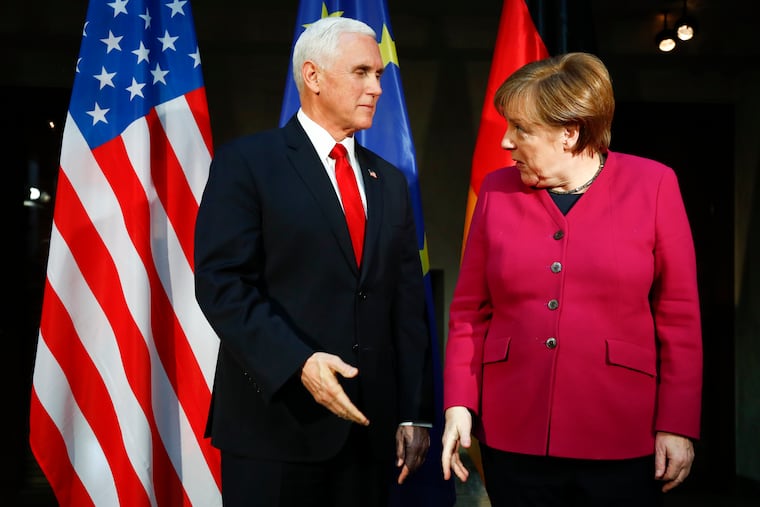Warring democracies: Mike Pence and Angela Merkel display open hostility at Munich Security Conference | Trudy Rubin
Munich Security Conference lays bare the dangerous, Trump-led schism between the United States and Europe that makes it easy for Putin and Xi to undermine the West.

MUNICH, Germany — Over the past few days I viewed, up close, the growing schism between the United States and Europe — which makes it easy for Russia and China to undermine the West.
The setting was the Munich Security Conference, an annual gathering of world leaders and foreign and defense officials to discuss security issues. The highlight pitted Vice President Mike Pence’s aggressive ode to America First versus Angela Merkel’s firm defense of the western alliance.
But the conference exposed far more than the bitter divisions between the United States and Europe in the Trump era. The theme of the conference was “The Great Puzzle: Who Will Pick Up the Pieces?” (a reference to the crumbling of the post-World War II order that has prevented global wars for seven decades).
Merkel’s answer was “only all of us together.” Pence firmly disagreed. Indeed, the White House is more interested in smashing that order than updating it.
Pence was clearly clueless that America First plays into the hands of Moscow and Beijing.
Of course, the postwar liberal international order was in trouble before Trump came to office. The 2008 crash and growing economic inequality have raised questions about economic institutions. The European Union has stumbled with Britain’s Brexit clouding its future. After the end of the Soviet Union, some argued NATO no longer served a purpose.
But as Merkel rightly insisted, the critical issues now confronting the West demand cooperation. From global warming to migration, from pushing back against Russian territorial aggression to pressing China on trade issues, the odds of success are higher if Washington coordinates with its allies.
At a time when the world is witnessing the return of great power competition, NATO takes on renewed relevance. Democracies in the West and Asia need to cooperate.
Instead, Pence produced a punchy campaign speech more suited to Ohio than to Munich. His whole approach was to lecture the Europeans on what they were doing wrong.
At a conference focused on security, the vice president’s only reference to NATO, in imitation of his boss, was in terms of dollars, urging members to up their defense spending. Yes, NATO members need to increase defense budgets. But Pence made no mention of the larger significance of NATO - beyond missiles and tanks.
It was left to Merkel, to lay out the principles that underlie America’s most important security alliance. “We need NATO as an anchor of stability in stormy times,” she said. “We need it as a community of values, because we should never forget that we founded NATO not just as a military alliance, but as a community of values in which human rights, democracy, and the rule of law are the guideline for joint action.”
Of course, Pence was just reflecting the attitude of President Trump who reportedly told aides in 2018 that he wanted to withdraw from NATO, and viewed it as a drain on the United States. Trump openly displayed his skepticism about the alliance at a NATO summit last year. His disdain so horrified allies that a plan to celebrate NATO’s 70th anniversary in Washington in April was downgraded to a foreign ministers’ gathering lest the president use it to publicly attack the alliance.
Nothing better serves the interests of Russian leader Vladimir Putin than to see Trump undermine NATO. At Munich, European defense officials fumed that Trump had tweeted his announcement that U.S. troops will soon leave Syria without even consulting NATO allies, such as France, that have their own troops there. The administration compounded the insult by urging the Europeans to replace U.S. troops with their soldiers.
German Defense Minister Ursula von der Leyen, whose country has provided logistical support and surveillance flights for the Syria operation, rebuffed that idea, stressing NATO troops should go “in together, out together.”
But Pence made clear, in Trump’s White House, togetherness was just not on.
So the eyes of European allies rolled when Pence demanded that European signatories abandon the Iran nuclear deal. As Merkel laid out, the Europeans are ready to join Washington in pressing Tehran on its missile tests, and on improving the deal. But they see no value in leaving Iran free to pursue nuclear weapons while that pressure is applied.
Pence’s sophistry and bombast at Munich only contributed to the sense of a world adrift. That mood wasn’t helped by the scornful remarks of Russian Foreign Minister Sergey Lavrov that Europeans were allowing themselves to be dragged [by Trump] into a “pointless confrontation with Russia.” (This is a line echoed by European autocrats, such as Hungary’s Viktor Orban, who is praised by Trump.)
So here is the message from Munich: European allies want leadership from Washington but scoff at Pence’s claim that “America is leading the free world once again.” Indeed, the question of who will pick up the pieces after the crumbling of the international order was not answered at the conference. The biggest debate there was over whether those pieces could be glued back together after 2020 if Trump failed to win a second term.